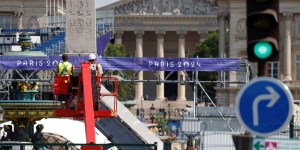Lenten Campaign 2025
This content is free of charge, as are all our articles.
Support us with a donation that is tax-deductible and enable us to continue to reach millions of readers.
The opening ceremony of the 2024 Paris Olympics, held on July 26, 2024, continues to generate controversy and push-back across the world, as many strongly criticized a part of the show featuring drag queens, that seemed to be a parody of the Last Supper.
The four-hour-long show featured athletes parading on boats on the Seine, a light show on the Eiffel Tower, scenic views and performances on Paris’ recognizable roads and landmarks, and much more.
However, one segment of the show was not well-received by many, as it seemed to be evoking Leonardo da Vinci’s famous depiction of the Last Supper in a mocking manner. It featured Leslie Barbara Butch, a French DJ and LGBTQ+ activist, standing at the center of a long table with a halo-like headpiece and DJ set, surrounded by drag queens. Then later, a French singer and actor, Philippe Katerine, appeared on a tray at the center of the table nearly nude, surrounded by food, and painted blue. He was supposed to represent the Greek God Dionysius.
This part of the show has generated strong criticisms and reactions from Christians and others around the world, and has continued to generate debates and discussions several days later.
The apologies
During a press conference on July 28 the spokesperson for the Olympics, Anne Descamps, said that “there was never an intention to show disrespect to any religious group.”
“On the contrary, I think [...] we really did try to celebrate community tolerance. [...] If people have taken any offense, we are, of course, really, really sorry,” she added.
In an interview with BFMTV that same day, the artistic director of the ceremony, Thomas Jolly, said that he was actually not inspired by Leonardo Da Vinci’s famous painting. Rather he said the performance was supposed to show a pagan celebration connected to the ancient Greek Gods, a nod to the Olympics’ country of origin, and hence the presence of Dionysius.
“You'll never find in me any desire to mock or denigrate anyone,” Jolly said. Online commentators have said the performance could have been imitating another painting, The Feast of the Gods by Dutch artist Jan Hermansz van Bijlert.
In an interview with French newspaper Le Monde published on July 30, Phillippe Katrine who performed Dionysius, said that “with Thomas Jolly, we never talked about religion, nor about Leonardo da Vinci's painting The Last Supper” nor about Jesus.
“I grew up in the Christian religion, and the most beautiful thing about this faith is the idea of forgiveness. So forgive me if I've let a misunderstanding slip, if I've offended people. I'm very sorry. I believe that forgiveness can be reciprocal,” he added.
Some of the reactions
Nonetheless, the performance is still generating debates and discussions online. The day after the opening ceremony, the French bishops issued a statement saying they “deeply regret[ed]” the segments in the show and were thinking of Christians “on every continent who have been hurt by the outrageousness and provocation of certain scenes.”
“We want them to understand that the Olympic celebration goes far beyond the ideological biases of a few artists,” the French bishops' statement insisted.
Several important Church members have also criticized the performance, such as Archbishop Vincenzo Paglia, president of the Vatican’s Pontifical Accademy for Life, or Archbishop Charles Scicluna of Malta, as well as many African bishops.
A notable example from the US is Bishop Robert Barron of Winona-Rochester, who posted a video on X saying this segment made a “gross” and “flippant mockery” of a central moment of Christianity and called on Catholics to “make our voices heard.” After the organizers apologized, he published another video criticizing the response saying it was “anything but an apology.”
Similarly, Bishop Andrew Cozzens of Crookston, currently in the spotlight after leading the massively successful Eucharistic Congress in Indianapolis, said in a statement on July 27 that the ceremony depicted The Last Supper “in heinous fashion, leaving us in such shock, sorrow and righteous anger that words cannot describe it.”
“Let us pray for healing and forgiveness for all those who participated in this mockery,” he said. In fact, many bishops and priests around the world have called for and offered acts or Masses of reparation to counter the show.
Be careful about divisions
Some Church prelates have also cautioned Catholics to be careful about letting anger get the upper hand and create more divisions.
“I fully understand that some Christians may have felt offended. When you touch on the religious, you touch on the intimate,” Cardinal François-Xavier Bustillo of Ajaccio, Corsica, told France Bleu on July 28.
However he also added that “it's not healthy to live and settle into incessant polemics,” highlighting the artistic director’s explanation for the segment.
Cardinal Bustillo emphasized that it is important to focus on the unity that the Olympics bring and react in a proportionate manner to controversies. “I retain the beauty and I also retain the point of vigilance,” he said about the opening ceremony.
Similarly, Bishop Emmanuel Gobilliard of Digne, France, a delegate of the Catholic Church in France for the Olympic Games, said in an interview with La Croix on July 28, that he believed that “we Christians must be careful not to respond to what seemed like provocation with provocation. I think we now need to take a step back and turn the page, to make way for sporting competition and the spirit of fraternity and unity of the Games.”










